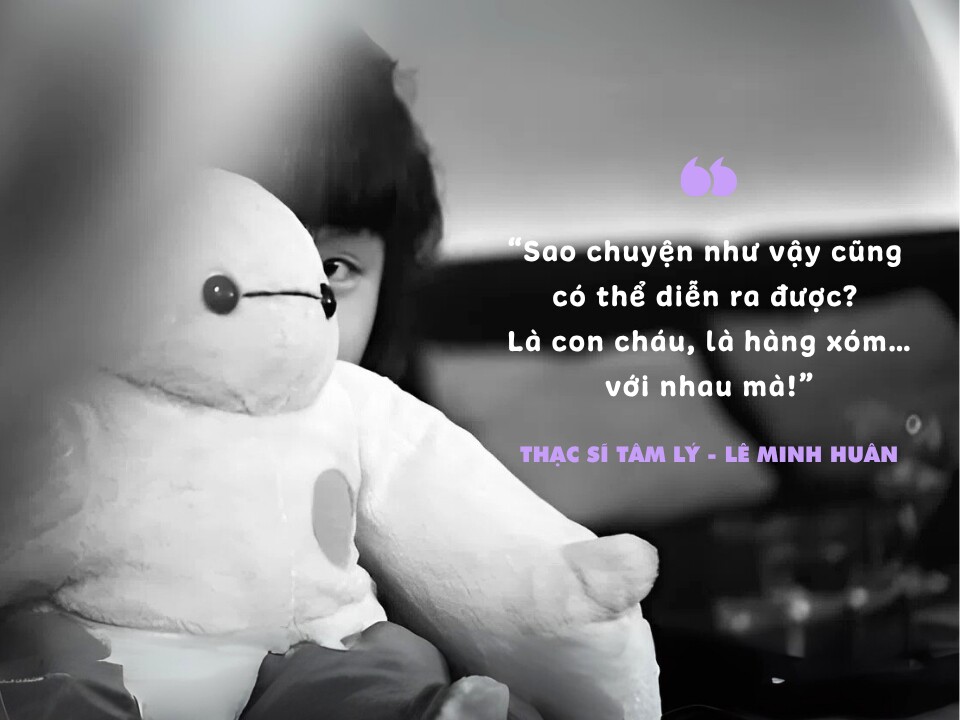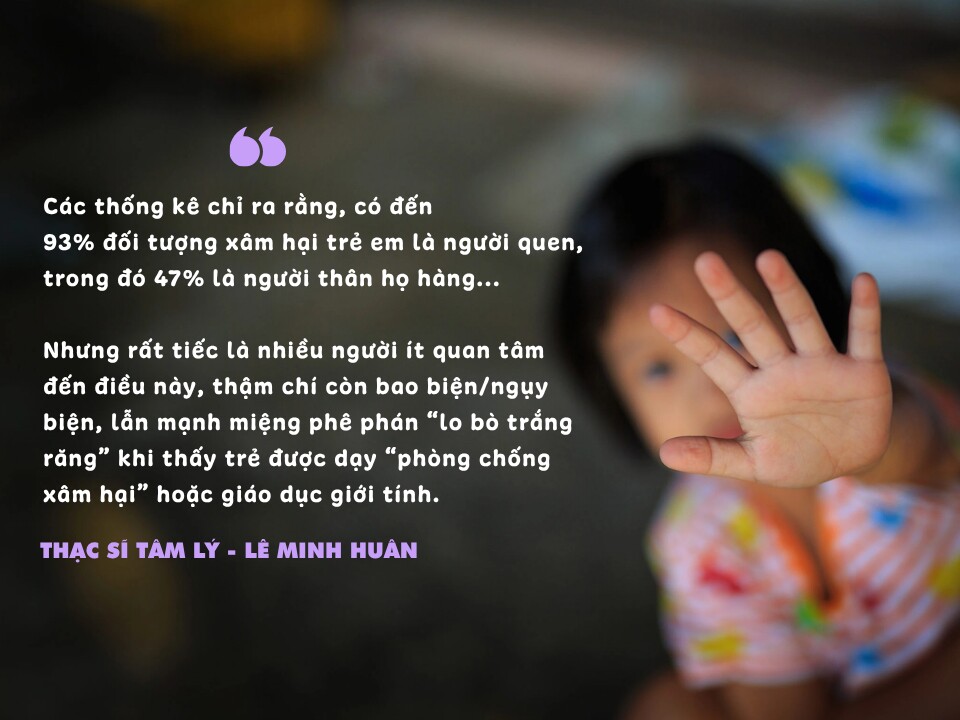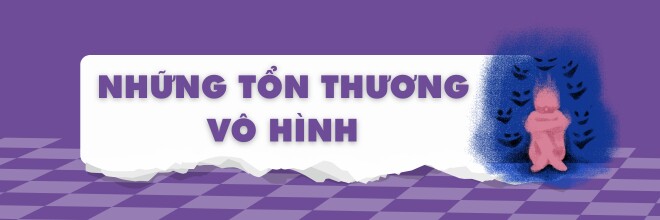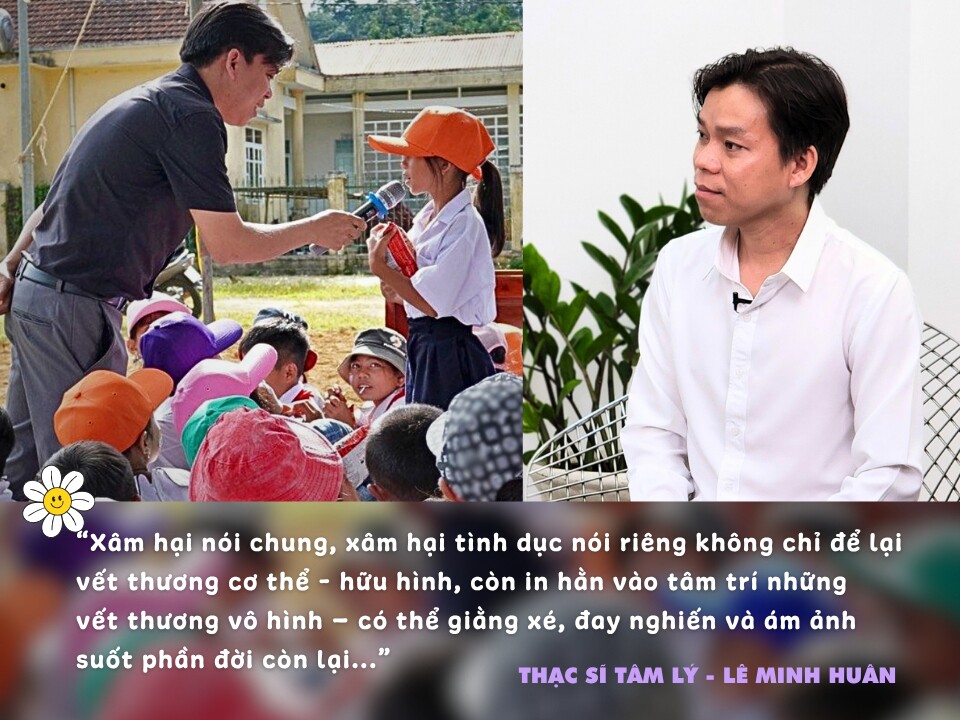For almost a decade, I’ve been teaching, supporting, and providing psychological counseling, including regular sex education training for schools and organizations within and outside the education sector. Every day, I bear witness to the plight of children and victims who struggle to meet their basic needs, yet are confronted with the scourge of sexual abuse and assault.
Among the many heart-wrenching stories, the one that shocked me the most was that of a 2.5-month-old infant sexually abused by a family member, followed by the tragic case of a preschooler who was sexually assaulted and then murdered by a young man from the neighborhood.
At times, professionals like us can only look at each other, shake our heads, and sigh in anguish, wondering how such heinous acts could occur within families and among neighbors. How could the perpetrators not consider the physical, psychological, and legal consequences of their actions? Their cruelty towards the children is unfathomable.

Regarding the case of the three-month-old baby girl sexually abused by a relative and admitted to the hospital with severe vaginal bleeding, Dr. Nguyen Thi Thu Huyen, a renowned education specialist, expressed her anguish: “It’s horrifying! I have supported cases of child abuse involving three-year-olds, but this incident is beyond my imagination.”
For over ten years, Dr. Huyen has been a pioneer in child protection, bringing books and education to communities and training over 20,000 students across provinces on the topics of sex education and abuse prevention. She and her team have tirelessly taught in schools with 1,000–2,000 students, dividing themselves into 20–30 classes to ensure that every child receives the necessary knowledge.
Beyond instructing children on self-protection, Dr. Huyen and her colleagues extend their reach to parents, teachers, school staff, and caregivers in orphanages and foster homes. However, she laments that “not many are willing to take the time to learn.”
Additionally, Dr. Huyen collaborates with specialists to provide teaching methodologies and essential knowledge to educators, staff, students, and parents, ensuring a unified understanding and effective coordination in education.
Sharing similar sentiments is Dr. Pham Thi Thuy, a sociologist with extensive experience in guiding children and parents on “Skills to Prevent Sexual Abuse.” Dr. Thuy is a familiar face in the media and has authored numerous books and materials on “Preventing Sexual Abuse” to equip children and caregivers with the necessary knowledge and skills for protection.

With keywords like “sexual abuse,” “child sexual abuse,” and “child abuse,” parents and educators can easily find information, solutions, and warnings about this scourge. However, many adults still lack the knowledge, skills, and methods to protect children effectively.

I vividly recall a statement made by an educated adult: “I think sex education is only necessary for middle school students and older. Younger children don’t understand these things, so why teach them?” I was taken aback by this subjective and biased opinion.
In reality, all ages need to be vigilant and proactive in self-protection. Everyone should enhance their understanding of sex education, abuse prevention, and relevant laws to better support and safeguard children.
During a radio counseling session, I told the listeners, “If we don’t teach children to protect themselves, provide them with knowledge and skills to prevent abuse, and do nothing at all, we are silently offering our children to the predators.”
The refrain, “Children are too young to understand, wait until they’re older,” is outdated and inappropriate in today’s society. Such attitudes reflect indifference, subjectivity, and a lack of responsibility on the part of families and schools regarding sex education and physical safety for children. This can lead to detrimental consequences when children interact with people outside their immediate circle.

According to statistics, in 2023, there were 2,498 reported cases of child abuse in Vietnam. Specifically, the National Children’s Hospital treated 66 abused children in 2024, with 65.1% suffering from physical abuse, 28.8% from sexual abuse, and 6.1% from neglect.
Many educators, psychologists, and our colleagues tirelessly visit underprivileged schools, orphanages, slums, and remote areas to protect children through concrete and practical educational programs on sex education and abuse prevention. We encourage each other to persevere and never give up in this endeavor.
We continue our efforts unwaveringly because we understand that abuse, especially sexual abuse, leaves not only physical scars but also indelible psychological wounds that can torment and haunt victims throughout their lives. This can significantly impact their present and future, affecting their studies, relationships, marriage, and overall social interactions.

A high school student, T., sought my support after experiencing sexual abuse at a public swimming pool. T. was terrified of her parents finding out and contemplated suicide to hide the truth. It took her many years to emotionally recover, during which she isolated herself, refusing to go anywhere without her parents. Her path to university was challenging due to the constant fear and suspicion of those around her, reminiscent of her abuser.
H., another victim, was sexually abused by her uncle when she was in 10th grade. The trauma haunted her every night, causing insomnia and anorexia. She began taking sleeping pills and anxiolytics to calm herself, which led to liver and kidney failure, requiring frequent hospitalizations. She struggled with the idea of romantic relationships, believing she had “lost her virtue.” When she eventually married, she faced difficulties conceiving and raising a child due to her psychological turmoil. H. even monitored her husband when he was near their daughter, gripped by anxiety and the constant fear for her child’s safety. During counseling, she expressed her daily worries and the haunting question, “What if I die one day? Will my child be safe?”
The consequences of sexual abuse can be long-lasting and pervasive, affecting all aspects of a victim’s life if left untreated.

To prevent child abuse, parents should pay attention to their children’s concerns, provide timely responses to their questions about friendships, studies, and social interactions, and equip them with self-protection knowledge and skills to handle suspicious individuals. Encourage your children to read books, watch videos, or read stories that promote healthy attitudes towards sex education.
Schools should regularly organize psychological and educational activities on sex education and abuse prevention during weekly meetings and class sessions. Utilize dynamic and practical methods, such as newsletters and competitions, to raise awareness about child protection laws and abuse prevention. Collaborate with specialists to ensure that educators, staff, students, and parents are unified in their understanding and approach to education.
The community and related organizations should continuously raise awareness through various media platforms, emphasizing the importance of vigilance against predators and the need to break the silence on child abuse and violence. Report any suspicious signs of abuse to the relevant authorities immediately. If sexual abuse is suspected, take the child for a medical examination and contact the Child Protection Hotline at 111 for timely support and guidance.



































